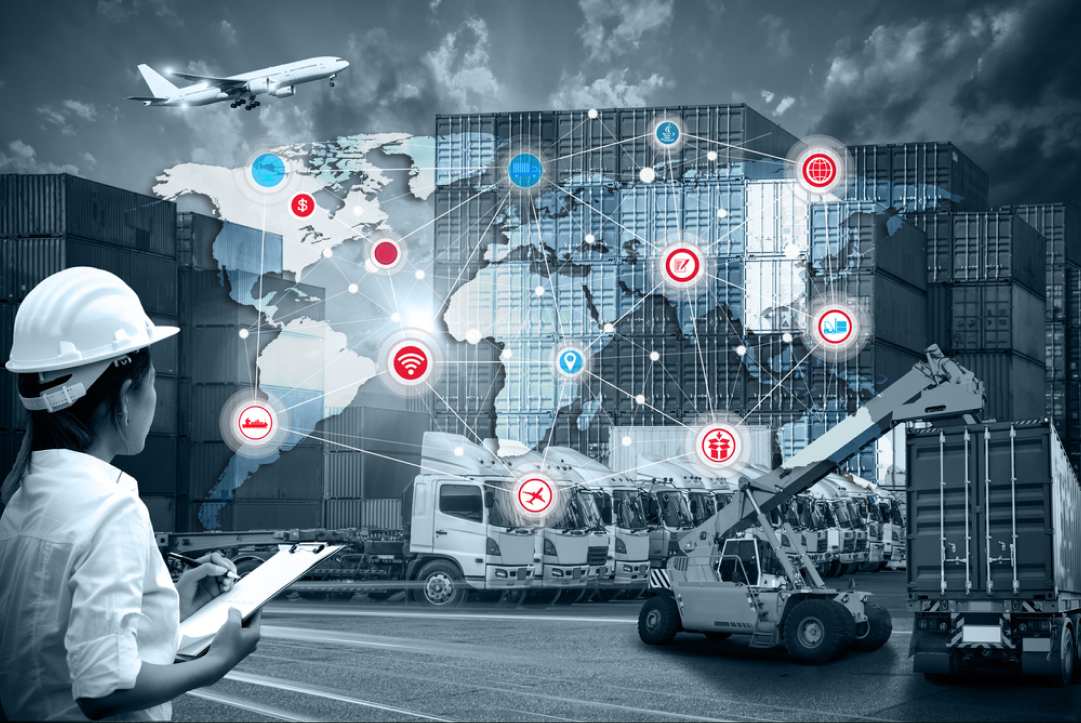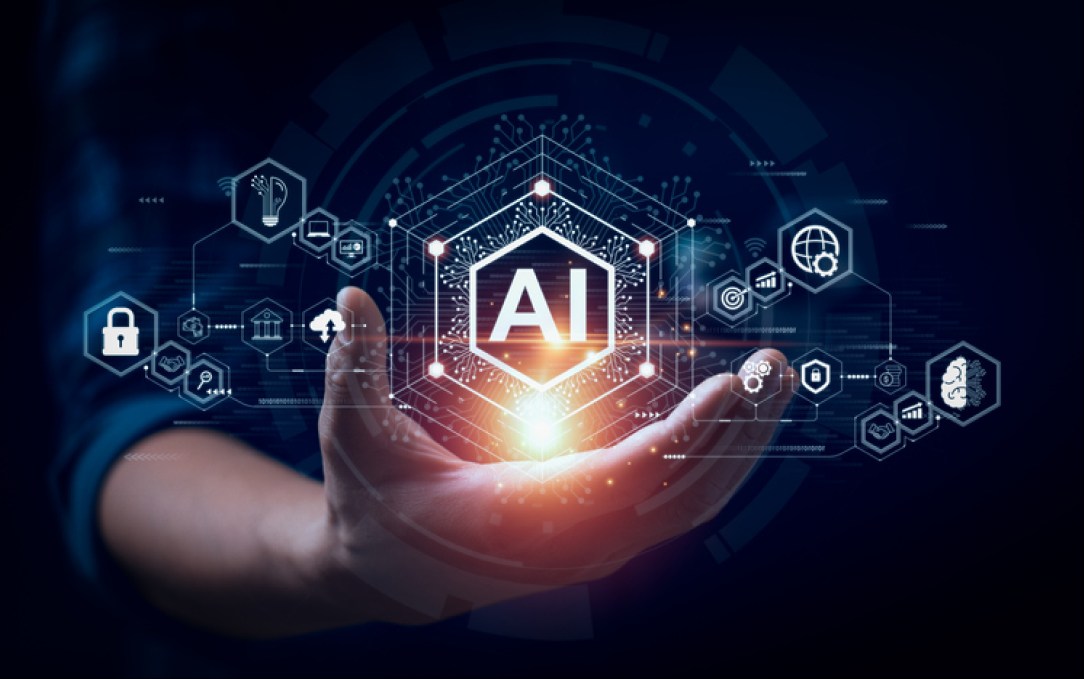In the fast-paced world of logistics and supply chain management, the quest for supply chain optimization has never been more critical. According to Grand View Research, 2022, the global AI supply chain market size was valued at $3.9 billion in 2021 and is projected to expand at a compound annual growth rate of 45.4% from 2022 to 2030. This staggering growth highlights the increasing adoption of AI logistics and supply chain optimization solutions across industries. By leveraging AI technologies like machine learning, computer vision, and natural language processing, businesses can gain enhanced supply chain visibility, make data-driven decisions in real-time, and drive operational efficiencies.
A Gartner survey revealed that 37% of organizations have already implemented AI in some form, with supply chain being one of the leading areas. AI supply chain solutions can optimize inventory management, predict demand accurately, automate warehouse operations through robotics, and streamline transportation routing. Continue reading to explore proven strategies that enterprises can adopt to reap the transformative benefits of an AI-driven supply chain optimization approach.
We build digital products to help businesses succeed!
What Is AI in Supply Chain And Logistics?
In the realm of supply chain and logistics, the integration of AI (Artificial Intelligence) is transforming traditional practices into more efficient, responsive, and intelligent operations. AI in supply chain refers to the use of machine learning algorithms and data analytics to improve and automate decision-making processes. This technology is pivotal for supply chain optimization as it enhances the ability to forecast demand, manage inventory, and streamline logistics operations.
- AI Supply Chain: The AI supply chain leverages intelligent algorithms to predict market trends, optimize inventory levels, and reduce operational costs. By analyzing vast amounts of data, AI can identify patterns that humans might overlook, leading to more informed and strategic decision-making.
- AI Logistics: In AI logistics, the technology is used to automate and enhance various aspects of the logistics process, including warehouse management, route planning, and delivery scheduling. AI can help logistics companies to become more agile and customer-focused by providing real-time insights and faster response times.
Integrating AI into supply chain and logistics, companies can achieve a significant competitive advantage, driving innovation and growth in an increasingly complex global market. AI is not just a technological upgrade; it’s a strategic imperative for modern supply chain management.

How is AI Used in Supply Chain Management?
AI supply chain solutions are revolutionizing supply chain optimization by enhancing operational efficiency, reducing costs, and improving customer service levels. Machine learning algorithms can analyze historical data to accurately forecast demand, enabling businesses to optimize inventory levels and prevent stock outs or excess inventory. Here’s how AI benefits supply chain management:
1. Robotics and Computer Vision
AI logistics tools leverage computer vision and sensor data to guide robotics systems in automating warehouse operations like picking, packing, and sorting – increasing throughput while minimizing errors.
2. Natural Language Processing (NLP) for Early Disruption Identification
Natural language processing (NLP) models can extract insights from unstructured data sources like social media, news reports, and customer feedback to identify potential supply chain disruptions early.
3. AI-Powered Logistics Planning
AI-powered route optimization software factors in real-time traffic, weather conditions, vehicle capacities, and last-mile requirements to plan the leanest transportation routes. This facilitates on-time deliveries while reducing fuel consumption and carbon emissions.
4. Predictive Maintenance for Uninterrupted Operations
Predictive maintenance enabled by AI can analyze IoT sensor data to detect potential equipment failures before they occur, ensuring uninterrupted operations. AI supply chain analytics provide end-to-end supply chain visibility by consolidating data across suppliers, manufacturing, distribution, and logistics on a single dashboard. This empowers data-driven decision making to swiftly respond to changes in demand or supply.
5. Autonomous Adaptation of Supply Chain Processes
By continuously learning from data, AI solutions can autonomously adapt supply chain processes, making them more agile and responsive to fluctuating market conditions. AI is a transformative force driving supply chain optimization for businesses of all sizes and industries.
5 Real Life Uses of AI in Supply Chain Management
1. Amazon
The e-commerce giant relies heavily on AI logistics and robotics for supply chain optimization in its fulfillment centers. Amazon uses computer vision and machine learning to automatically identify and sort packages, while AI-guided robots efficiently move inventory and prepare orders for shipping.
2. DHL
The logistics company has implemented an AI supply chain solution called “Resilience360” that leverages machine learning and natural language processing. It analyzes data from various sources to identify potential supply chain disruptions like natural disasters or geo-political events and provides recommendations to mitigate risks.
3. Stitch Fix
The online personal styling service employs AI and machine learning algorithms to forecast demand for clothing items, optimize inventory levels, and make data-driven merchandising decisions. This AI supply chain approach has helped Stitch Fix reduce costs and minimize product waste.
4. Flexport
This digital freight forwarder has developed an AI logistics platform called “OpmCloud” that uses machine learning to automatically route shipments, track shipments in real-time, and provide intelligent shipment scheduling recommendations to customers.
5. IBM
The tech giant offers the “IBM Supply Chain Intelligence Suite” which applies AI, IoT, and blockchain technologies for supply chain optimization. It uses AI to automate routine supply chain decisions, trigger exception workflows, and provide descriptive and predictive analysis.
Benefits of AI in Supply Chain Management
1. Enhanced Operational Efficiency and Cost Savings
AI supply chain solutions are transforming the supply chain by unlocking unprecedented operational efficiencies, cost savings, and competitive advantages. By leveraging AI logistics capabilities like machine learning, computer vision, and natural language processing, businesses can gain real-time visibility into their entire supply chain network. This enhanced transparency allows them to proactively identify and mitigate potential disruptions before they cascade into major issues.
2. Improved Demand Forecasting
AI-driven demand forecasting models can analyze a multitude of data sources to predict demand with far greater accuracy than traditional methods. This enables tighter supply chain optimization by producing leaner inventory levels aligned with actual consumer needs, reducing working capital requirements and minimizing wastage or stockouts.
3. Warehouse Automation
In the warehouse, AI powers autonomous robotics systems that can automate tedious and labor-intensive tasks like picking, sorting, and packaging with higher throughput and virtually zero errors.
4. Optimized Logistics and Transportation
AI logistics route optimization engines factor in dynamic variables like traffic patterns, weather conditions and vehicle capacities to plan the leanest transportation routes, reducing fuel costs and carbon emissions.
5. Data-Driven Decision Making
Moreover, AI supply chain analytics provide descriptive and predictive insights that allow businesses to make data-driven decisions rapidly in response to changing market conditions. By continuously learning and adapting processes autonomously based on data, AI fundamentally enhances supply chain agility and resilience.
6. Future-Ready Supply Chain
An AI-powered approach promises a synchronized supply chain that is intelligently adapted to future demands and challenges. From forecasting accuracy to warehouse/logistics automation and end-to-end optimization, the benefits of an AI-powered approach are compelling for any business striving to build a future-ready, intelligently synchronized supply chain.

Will AI Replace Supply Chain Management?
While AI supply chain solutions undoubtedly drive tremendous supply chain optimization and efficiency gains, it is unlikely that AI will entirely replace human supply chain management roles anytime soon. AI logistics technologies excel at automating repetitive tasks, processing massive datasets, and providing data-driven recommendations. However, supply chains are highly complex ecosystems involving multiple stakeholders, geographies, and dynamic variables. Human expertise will still be required to provide oversight, make strategic decisions, negotiate with partners, and handle exceptions that AI cannot resolve autonomously.
Future Outlook- Let’s Peep into It
The future trajectory points toward humans and AI supply chain systems working in synergy. AI will augment and amplify human capabilities by taking over mundane tasks, surfacing insights from data, and continuously optimizing processes. But seasoned supply chain professionals will be indispensable to harness AI’s potential judiciously, build organizational AI capabilities, and steer AI-powered supply chain transformations responsibly and ethically. The true opportunity lies in seamlessly blending AI and human intelligence to unlock sustainable competitive advantages.
Conclusion
The integration of AI in supply chain management is not just a technological advancement; it’s a transformative movement that redefines the essence of supply chain optimization and AI logistics. As we’ve seen, AI is used in supply chains to enhance operational efficiency, improve demand forecasting, and drive warehouse automation, among other benefits. While AI significantly augments the capabilities within the supply chain, it works best in tandem with human expertise, ensuring strategic decisions and complex problem-solving remain in capable hands. The future of AI in the supply chain is bright, promising a more agile, efficient, and responsive framework for businesses to thrive in a competitive marketplace.
Offices
India
86P, 4th Floor, Sector 44, Gurugram, Haryana 122003Singapore
#21-02, Tower 2A, The Bayshore condo, Singapore 469974Canada
8 Hillcrest Avenue Toronto ON M2N 6Y6, CanadaUS
31 River CT, Jersey City, New JerseySubscribe to our newsletter
Our Services
Top Reads
India
86P, 4th Floor, Sector 44, Gurugram, Haryana 122003
Singapore
#21-02, Tower 2A, The Bayshore condo, Singapore 469974
Canada
8 Hillcrest Avenue Toronto ON M2N 6Y6, Canada
US
31 River CT, Jersey City, New Jersey
Contact us
info@primathon.in
+91-9205966678
Reviews


